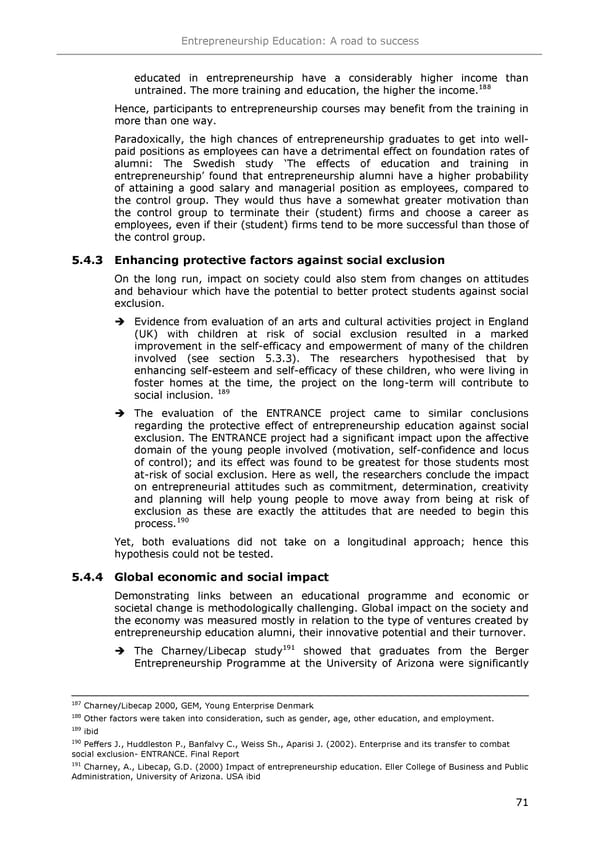Entrepreneurship Education: A road to success educated in entrepreneurship have a considerably higher income than 188 untrained. The more training and education, the higher the income. Hence, participants to entrepreneurship courses may benefit from the training in more than one way. Paradoxically, the high chances of entrepreneurship graduates to get into well- paid positions as employees can have a detrimental effect on foundation rates of alumni: The Swedish study 8The effects of education and training in entrepreneurship9 found that entrepreneurship alumni have a higher probability of attaining a good salary and managerial position as employees, compared to the control group. They would thus have a somewhat greater motivation than the control group to terminate their (student) firms and choose a career as employees, even if their (student) firms tend to be more successful than those of the control group. 5.4.3 Enhancing protective factors against social exclusion On the long run, impact on society could also stem from changes on attitudes and behaviour which have the potential to better protect students against social exclusion. Evidence from evaluation of an arts and cultural activities project in England (UK) with children at risk of social exclusion resulted in a marked improvement in the self-efficacy and empowerment of many of the children involved (see section 5.3.3). The researchers hypothesised that by enhancing self-esteem and self-efficacy of these children, who were living in foster homes at the time, the project on the long-term will contribute to 189 social inclusion. The evaluation of the ENTRANCE project came to similar conclusions regarding the protective effect of entrepreneurship education against social exclusion. The ENTRANCE project had a significant impact upon the affective domain of the young people involved (motivation, self-confidence and locus of control); and its effect was found to be greatest for those students most at-risk of social exclusion. Here as well, the researchers conclude the impact on entrepreneurial attitudes such as commitment, determination, creativity and planning will help young people to move away from being at risk of exclusion as these are exactly the attitudes that are needed to begin this 190 process. Yet, both evaluations did not take on a longitudinal approach; hence this hypothesis could not be tested. 5.4.4 Global economic and social impact Demonstrating links between an educational programme and economic or societal change is methodologically challenging. Global impact on the society and the economy was measured mostly in relation to the type of ventures created by entrepreneurship education alumni, their innovative potential and their turnover. 191 The Charney/Libecap study showed that graduates from the Berger Entrepreneurship Programme at the University of Arizona were significantly 187 Charney/Libecap 2000, GEM, Young Enterprise Denmark 188 Other factors were taken into consideration, such as gender, age, other education, and employment. 189 ibid 190 Peffers J., Huddleston P., Banfalvy C., Weiss Sh., Aparisi J. (2002). Enterprise and its transfer to combat social exclusion- ENTRANCE. Final Report 191 Charney, A., Libecap, G.D. (2000) Impact of entrepreneurship education. Eller College of Business and Public Administration, University of Arizona. USA ibid 71
 Entrepreneurship Education Page 74 Page 76
Entrepreneurship Education Page 74 Page 76